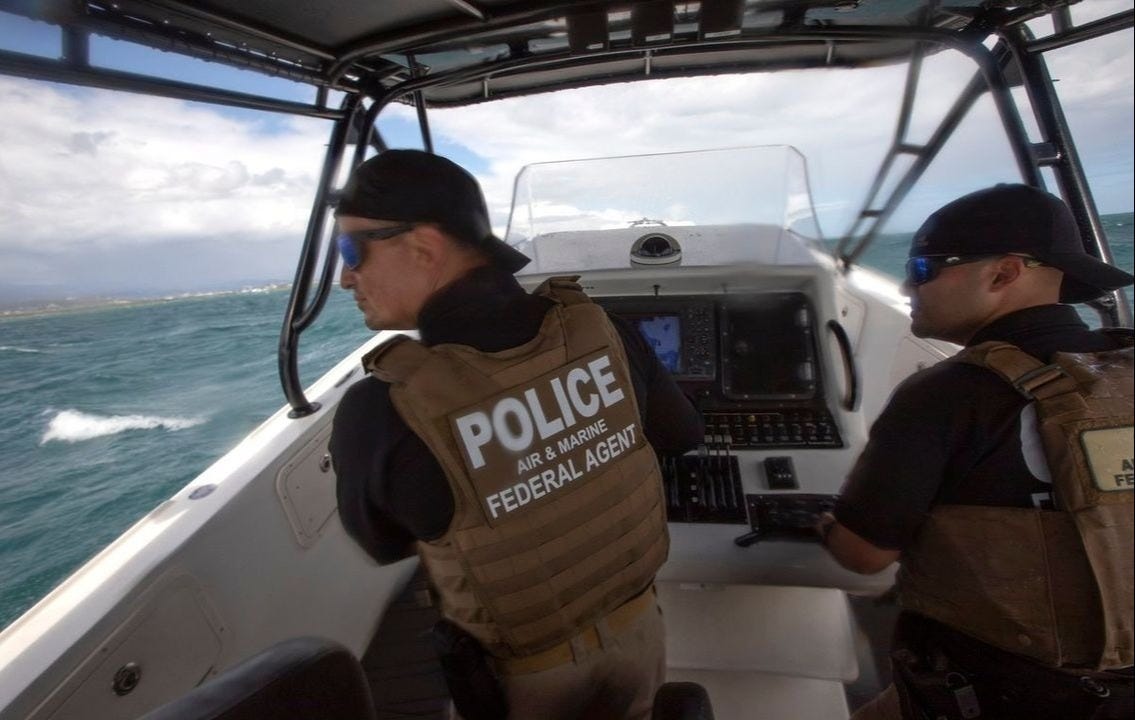Federal Courts Consider Migrant Renditions to El Salvador (Newsletter)
Ocean Smuggling Routes Boom
THE WEEK IN BRIEF:

El Salvador renditions reach the Supreme Court: The Supreme Court made two rulings related to the Trump administration’s practice of sending migrants to a mega-prison in El Salvador. The first requires that people subjected to rapid expulsion under the Alien Enemies Act have a reasonable chance to defend themselves. The second upholds, though softens, a lower-court judge’s requirement that the administration seek the release and return of a wrongfully expelled Salvadoran man. The President of El Salvador is to visit Washington on April 14.
Evidence points to little criminality among those rushed to El Salvador’s mega-prison: As experts cast doubt on tattoos as a sign of Venezuelan gang membership, three studies indicate that a substantial majority of those rendered to El Salvador had no known criminal records.
As the budget bill moves slowly through Congress, a $45 billion bill for migrant detention is foreseen. A request for proposals issued to contractors foresees ramping up migrant detention spending sixfold to $45 billion over two years. That would be paid for by a giant one-time appropriation slowly working through the Republican-majority Congress, which cleared an important initial hurdle this week.
New measures to undo legal pathways and punish the undocumented: This week saw CBP One app recipients receive an order to self-deport, a proposal to fine migrants up to $998 per day if they stay after receiving removal orders, movement toward a registry of undocumented migrants, and a continued legal fight over Temporary Protected Status (TPS) for Venezuelans.
A woman dies by suicide in Border Patrol custody as internal oversight is decimated: A female citizen of China died by suicide in a California Border Patrol station. This and other recent incidents raise questions about oversight at a time when the Trump administration has effectively closed down the Department of Homeland Security’s (DHS) internal investigative agencies.
Developing: A Louisiana Immigration Judge has ruled that the US can revoke Columbia University graduate Mahmoud Khalil’s Legal Permanent Resident status because of his pro-Palestinian views. His lawyers will next argue his case in a US Federal Court in New Jersey.
THE IMPACT IN MEXICO & ON THE US BORDER

The San Diego Union-Tribune reported that as it becomes harder to cross the land border into the United States, more people are migrating from Tijuana via maritime routes up the Pacific Ocean. During two weeks in late March, the Southern California Coast Guard reported 18 maritime smuggling incidents involving 93 people. The pace of maritime migrant apprehensions in San Diego resembles last year’s, even as land-border apprehensions plummet. Migrants say they pay smugglers between $3,000 and $17,000 for the ocean journey.
“With no way to legally enter the U.S., the mood among migrants still in Tijuana has shifted from cautious optimism to hopelessness,” the Los Angeles Times’s Andrea Castillo reported from the Mexican border city, noting that many are now giving serious consideration to trying to cross the border illegally. Migrant shelters, including the long-established Casa del Migrante, are struggling to provide even for their currently reduced populations due to the Trump administration’s sweeping cutoffs of foreign assistance.
Spain’s El País reported on Venezuelans in Mexico who have given up hope of being able to migrate, and are now petitioning for a very limited number of free spots on aircraft that would repatriate them from Mexico City to Caracas. “The criteria for selection are unclear, and the wait is long.”
As the Trump administration’s cutoff of asylum access at the border has forced Haitian migrants to seek protection in Mexico instead, many face heightened risk there, according to a report from the Institute for Justice and Democracy in Haiti. “Black migrants in particular face violence, discrimination, extortion, significant hurdles to refugee or other legal status, and many other vulnerabilities in Mexico. As such, many Haitians never intended to live in Mexico and many feel unsafe there.”
Mexico’s government reported that security forces deployed to the country’s northern border zone since February 5, when they were sent following President Trump’s first threat to impose tariffs, have detained 2,300 people and seized 2,033 firearms and 163 kilos of fentanyl.
NOTE: This weekly summary was adapted from a far more comprehensive one by WOLA.org, which you can read in full HERE.
(If you found this summary helpful, I invite you to financially support WOLA’s work).
BORDER POSTS OF NOTE IN OTHER SUBSTACKS
Ioan Grillo of CrashOut reports Mexico is considering another mass “expulsion” of dozens of senior cartel figures from Mexican prisons to U.S. custody.

Matt Benacci of The Calvary Dispatch explains the reasons behind an upsurge in US Military Activity in the Big Bend of West Texas - and looks back fondly on a time when the US Army actually imported camels to Texas!
FINALLY, IN CASE YOU MISSED IT
(Stories US Border News covered during the past week):
Holy Week/Spring Break Advisories
Cartels Lose $510M in Drugs to US Coast Guard
Cartels' Half-Billion Dollar Hit
Border Crackdown on Cartel Cash & Guns
Gunrunners & "Money Mules" Targeted

$75.5K vacuum-sealed, a .22 caliber pistol, and .5 grams of cocaine discovered inside a smuggler's vehicle in South Texas on March 31, 2025. (US Border Patrol photos)
I remain committed to delivering a US Border Newsletter that is not only educational and insightful but also engaging and easy to digest in five minutes or less.
(How am I doing? Let me know in the comments!)
Abrazos,
Jack Beavers



